https://edition.cnn.com/2018/11/23/asia/taiwan-referendum-olympic-chinese-taipei-intl/index.html?no-st=1543036981
Taiwan to vote on changing 'Chinese Taipei' Olympic name
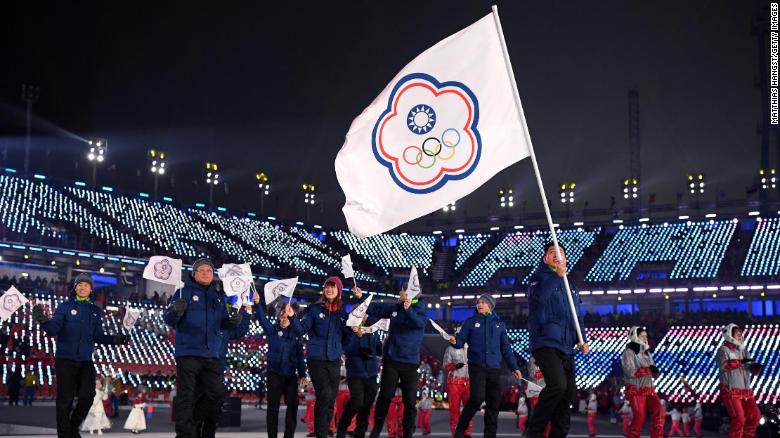
Flag bearer Te-An Lien of Chinese Taipei and teammates enter the stadium during the Opening Ceremony of the PyeongChang 2018 Winter Olympic Games at PyeongChang Olympic Stadium in South Korea.
(CNN)Millions of Taiwanese voters will go to the polls Saturday to decide whether the island's Olympic athletes should compete under the name "Taiwan," setting up a potential showdown with both the Beijing government and the International Olympic Committee.
Currently, Taiwan's athletes must compete in Olympic and other international competitions under the banner "Chinese Taipei" under a 1979 IOC resolution.
In a letter to the Chinese Taipei Olympic Committee, the IOC warned that if the territory pushed ahead with a name change, it could threaten Taiwan's participation in future Olympic Games.
The reason is political and stems from longstanding divisions with China that have existed since the end of the Chinese Civil War in 1949.
Up until the 1970s, Taiwan competed at the Olympics under its official name, the Republic of China (ROC). That changed in 1971, with the decision by the United Nations to acknowledge Beijing as the only legitimate government of China.
Countries across the world quickly switched their diplomatic recognition of China from the government in Taipei to Beijing, leaving Taiwan isolated.
In 1976 and 1980 Taiwan boycotted the Olympic Games, after the host nations refused to allow its team to compete under the ROC moniker.
When Taiwan returned to the 1984 Olympics it was under the name "Chinese Taipei" following the 1979 agreement between the IOC and China that allowed the island to compete, but not use its own name, flag or anthem.
A referendum is unlikely to unravel that binding commitment, known as the Nagoya Resolution, which Taiwan signed in 1981.
In a statement to CNN on Thursday, the IOC said that the 1979 agreement "remains unchanged and fully applicable."
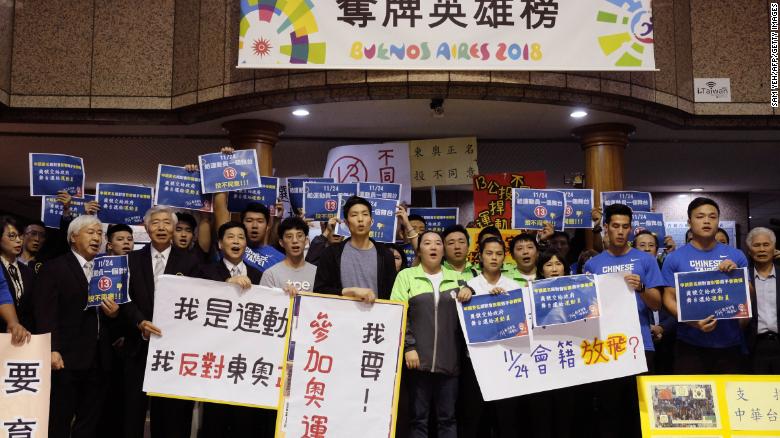
Taiwanese athletes and trainers oppose a proposal to change the name it uses at sports events from the current "Chinese Taipei" on November 21, 2018.
Athletes risk losing out
In the years since the original agreement, many Taiwanese have become more assertive of their identity and autonomy, especially in the wake of the 2016 election of President Tsai Ing-wen, whose party traditionally boasts strong pro-independence sentiment.
Any recognition of Taiwan as a separate nation is resisted forcefully by China, which regards the island as a breakaway province, including in the world of sports. But public calls for an independent Taiwan are growing.
In October, thousands joined the island's first mass independence rally and last week Taiwanese filmmaker Fu Yue expressed her wish for an independent Taiwan at the annual Golden Horse film awards.
Spearheading the name change is the group "Team Taiwan Campaign for the 2020 Tokyo Olympics," led by track and field Olympic medalist Chi Cheng.
Speaking at a protest earlier this year, Chi noted that Taiwan is the only member of the IOC prohibited from competing under its own name.
"It's very aggravating, humiliating and depressing to not be able to use our own country's name and national anthem at the Olympic Games," she said, according to Taiwan's Central News Agency.
But other top athletes have publicly expressed opposition to the poll, wanting to ensure they keep the right to compete in future international competitions.
"We oppose the referendum not because we don't love our country, but because we need to follow the rules and the agreement," said archer and Olympic bronze medalist Lei Chien-ying during a protest on November 24, according to Taiwan's Central News Agency.
"Hard-working Taiwanese athletes need a stage on which to showcase their strengths so that people around the world can know that we are actually from Taiwan," she said.
Inflaming tensions
An amendment to the Referendum Act passed in January that lowered the voting age from 21 to 18 and decreased the number of signatures needed to initiate a referendum enabled those pushing for a name change to put the decision to the public.
The Olympic vote is just one of several referendums taking place on Saturday, and included in the raft of issues are votes on same-sex marriage, nuclear power and food imports from areas affected by the Fukushima nuclear disaster.
To pass, a referendum now needs a quarter of eligible voters to approve it, rather than the 50% before the amendment.
While Taiwan's Central Election Commission said the referendum is legally binding, there is debate on whether or not the result is enforceable.
The result is likely to mean more political pressure for President Tsai, whose Democratic Progressive Party (DPP) will see Saturday's local elections as a test for nationwide polls in 2020.
The name-change vote is widely seen as indicator of the depth of support among voters for the island's independence movement. Should it pass, the DPP will be forced to choose between inflaming tensions with Beijing, or abiding by the will of the people.
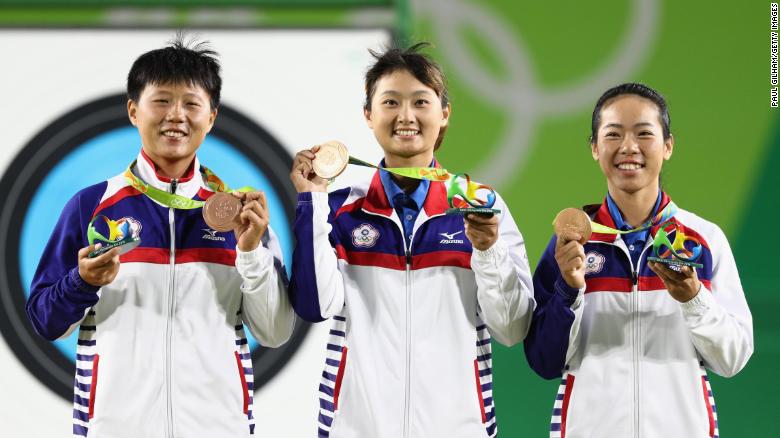
Team Chinese Taipei celebrate with their Bronze medals after finishing third in the Women's Team Finals at the Rio 2016 Olympic Games on August 7, 2016.
In the run-up to the poll, Ma Xiaoguang, spokesperson for China's Taiwan Affairs Office, warned against voting in favor of the name change, saying it would "damage the interests of Taiwan residents, particularly Taiwan athletes."
Cross-strait relations have cooled under Tsai's leadership and the Chinese government under President Xi Jinping has become more tenacious in asserting its claim over the island.
In addition to military displays of power, Beijing has ordered foreign airlines and other businesses to remove references to Taiwan as an independent entity from their websites. It has also excluded Taiwan from taking part in international forums, and pressured the island's remaining allies to sever diplomatic relations with the territory.
James Griffiths contributed to this report.
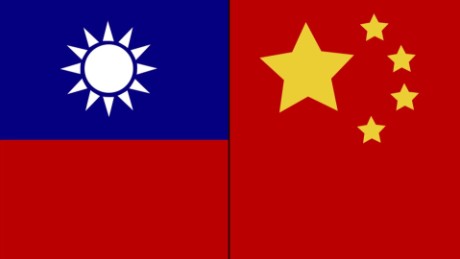
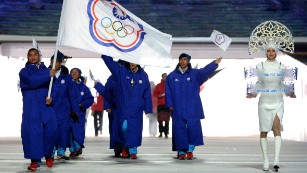
沒有留言:
張貼留言